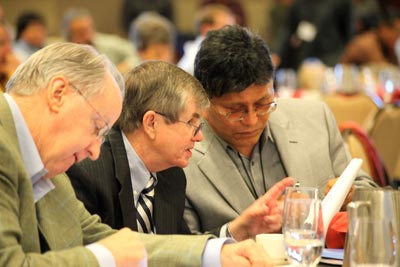A two-day summit this week at Northern Arizona University is focusing on sustainable economic development on Navajo and Hopi tribal lands.
The gathering is the result of an extensive study conducted by NAU’s Landsward Institute and intended to facilitate economic growth in the Four Corners area of Arizona, New Mexico, Colorado and Utah—part of the traditional homelands of several American Indian tribal nations.
Regional tribal leaders, government and academic officials and corporate and private investors attending the Four Corners Sustainable Economic Development Summit will explore opportunities to implement strategies outlined in the study.
“Regional universities like NAU have a special responsibility in the economic development of the areas in which they are located,” said NAU President John Haeger. “NAU is both a good educational institution as well as an economic development engine.”
The summit is considered the first step in a multiyear process centered on four areas for potential sustainable economic development in the region: renewable energy, manufacturing, agriculture, and cultural and ecotourism.
Among the panelists and participants at the Nov. 3-4 summit are Charles Galbraith, White House intergovernmental affairs officer; Dallas Tonsager, USDA undersecretary; LeRoy Shingoitewa, chairman of the Hopi Tribe; Ben Shelly, president of the Navajo Nation; and Fred DuVal, chair of the Arizona Board of Regents.
Subsequent research and events of the Four Corners Sustainable Futures Initiative will focus on other tribes of the Four Corners region.
“While economic development is a key focus, it’s also about sustainable cultural values and environmental sustainability,” said Laura Huenneke, NAU vice president for research. “The emphasis is on the long-term, and the university can contribute to all those areas.”



